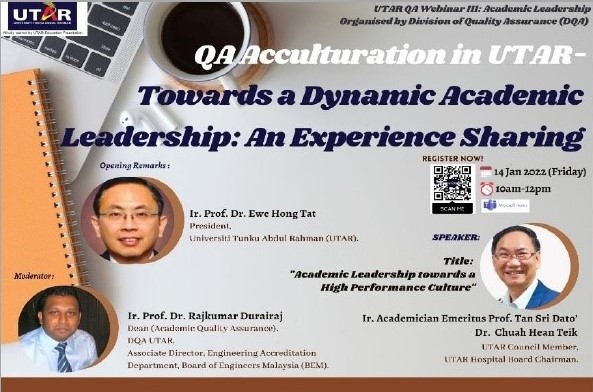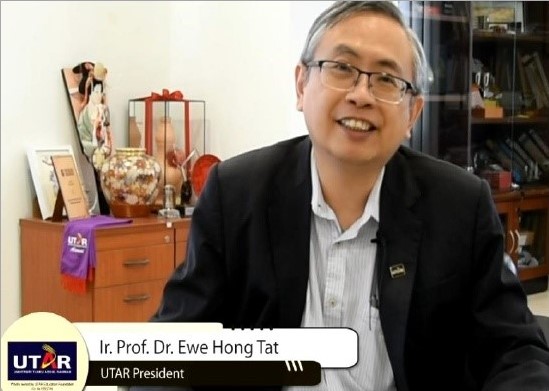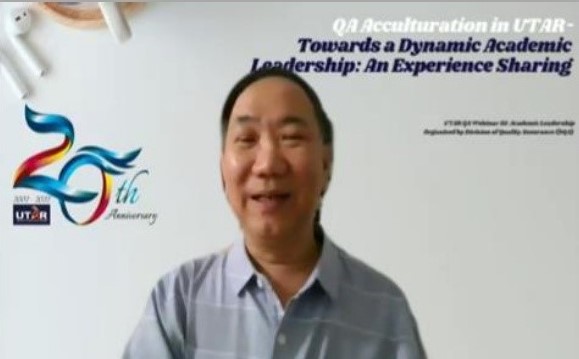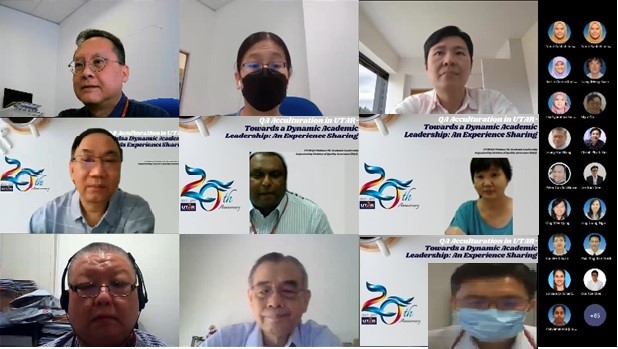
Insights on academic leadership

UTAR QA Acculturation webinar poster
In conjunction with UTAR’s 20th Anniversary, the Division of Quality Assurance (DQA) organised QA Webinar III: Academic Leadership on 14 Jan 2022 via Microsoft Teams. Themed QA Acculturation in UTAR – Towards a Dynamic Academic Leadership: An Experience Sharing, the webinar shed light on the principles of academic leadership, effective academic leaders and continuous quality improvement (CQI).

Prof Ewe delivering his opening remark
Gracing the webinar with an opening remark was UTAR President Ir Prof Dr Ewe Hong Tat. “His experience sharing in the past was able to motivate us and encourage us to face challenges. It also provided ways for us to remain optimistic. I believe his experience sharing today will equally benefit all of us. I hope we will also keep a growth mindset that will help us overcome challenges, and enable us to emerge better, and make UTAR better,” said Prof Ewe. Also present were Vice President for Internationalisation and Academic Development Ir Prof Dr Goi Bok Min, Dean of Academic Quality Assurance and Audit Ir Prof Dr Rajkumar Durairaj, DQA Director Loh Siaw Yien, Deans, Deputy Deans, staff and participants.

Tan Sri Chuah sharing some of the qualities he acquired throughout his career
Invited to share his experience on “Academic Leadership towards a High Performance Culture” was UTAR Hospital Board Chairman and UTAR Council Member Ir Academician Emeritus Prof Tan Sri Dato’ Dr Chuah Hean Teik. He kick-started his talk by sharing his academic journey from his primary school days to the moment he completed his tertiary education by obtaining PhD in Electrical Engineering at Universiti Malaya. He recalled the days when he worked on his Master’s research using only paper and pencil, and IBM8088 Machines; a time when supercomputer, advanced equipment, and R&D funding were still not available. He quoted, “If a person can only work when given everything under the sun, he is just mediocre. If a person can perform within constraints, he is a real achiever.” He then shared the lesson he learnt from that experience—to be humble, no one is perfect, do not cover up mistakes, be truthful, and push the frontier of knowledge.
Tan Sri Chuah pursued his PhD while working as a full-time lecturer. He advised participants to be positive and reminded them to continuously acquire new knowledge because learning never stops. Balancing between his PhD and teaching also taught him the importance of time management, learning from students, walking an extra mile to help, possessing the right attitude and not being selfish, technical skills, social skills, and cultural skills. He mentioned, “It is not the method that is important, it is how we apply the method to solve the problem and find an innovative solution, which is most practical and acceptable at the material time”.
Participants were enlightened on his career journey from being a lecturer a the University of Malaya and securing positions of Dean, Director and Vice President in Multimedia University, to becoming the President of UTAR from 2008 to 2019, and being conferred Emeritus Professor in October 2019. He also shared his involvement in various professional bodies and numerous recognitions he received throughout his career.
He then spoke about the Waves of the Technological Revolution and the trends in the globalised world. However, he also highlighted that education remains an important drive to improve the source of human capital, uplift poverty, catalyse change and innovation, and drive economic growth. Therefore he advised that educational institutions of higher education must look into the issues of Quality Assurance/Governance, financing, emphasis on TVET, equity, access and innovation, and employability of graduates.
He also highlighted that universities function to create knowledge, disseminate knowledge, preserve knowledge and bring positive impact of knowledge. More than that, he mentioned that it is important for academics to contribute towards the economic growth of the country and support the industry for humanity. He advised participants to remember the basic duties and responsibilities of education, which were, training of wholesome individuals with high morals and ethical values, and analytical minds; training of individuals who will have high spirit and keep abreast with the latest technology; training of individuals who look for global opportunities; training of graduates with cultural intelligence; and remembering human-human interaction, human-nature harmony, ethics, and professionalism.
When he spoke on curriculum development, he emphasised on the strengthening of fundamentals, development of analytical mind, knowledge exploration, self-development, social network linkage, surviving constraint challenges, and following global advances. He also advised that more application and real-life examples be incorporated in lectures; more open-ended assignments with relations to everyday life and contemporary issues be prepared; more elective options given to students; promote international exchange on credit transfer basis; and introduce professional skill-set in lectures and tutorials.
Participants also learnt the need to incorporate Sustainable Development Goals in the curriculum. Tan Sri Chuah emphasised the need to make innovation an important goal and sustainability an integral part of the curriculum. He also advised participants to apply the 3IC’s, which were integrity and competence; integration and communications; internationalisation and cooperation. Towards the end, he reminded participants, “Your values determine your code of conduct; your global perspectives determine your order of thinking; and your life outlook determines your life pursuit.”
Tan Sri Chuah answering some questions asked by participants as Prof Rajkumar moderates the Q&A session

Some of the participants with the speaker, Tan Sri Chuah (middle row, far left box) and organiser
© 2022 UNIVERSITI TUNKU ABDUL RAHMAN DU012(A).
Wholly owned by UTAR Education Foundation (200201010564(578227-M)) LEGAL STATEMENT TERM OF USAGE PRIVACY NOTICE